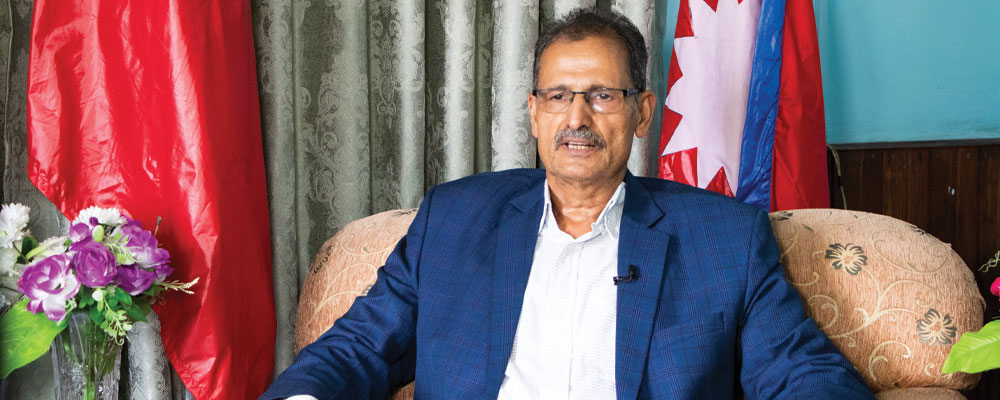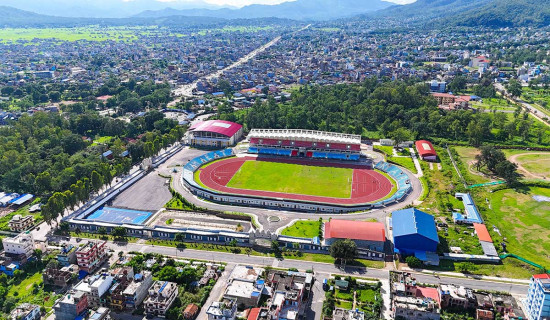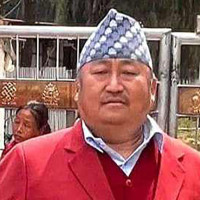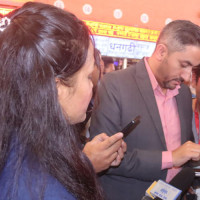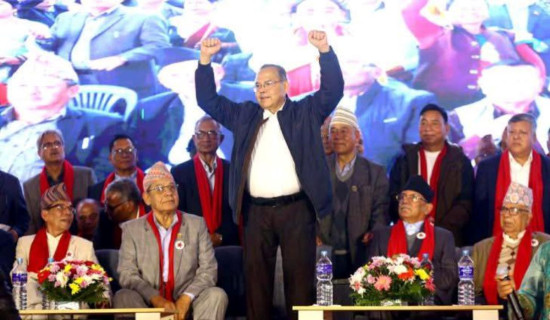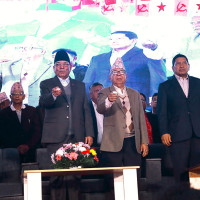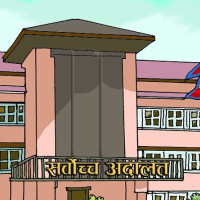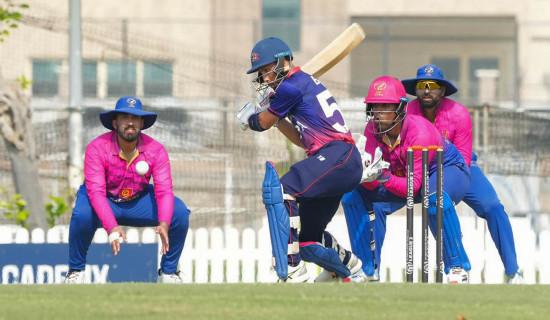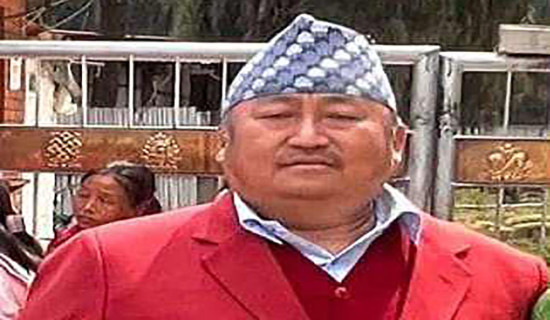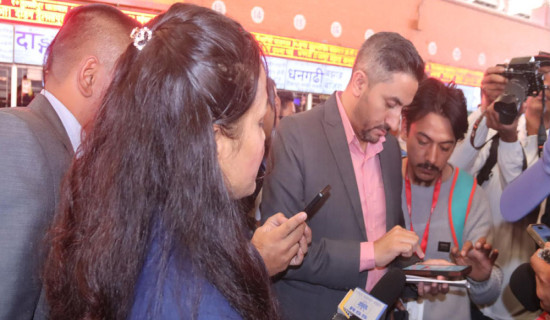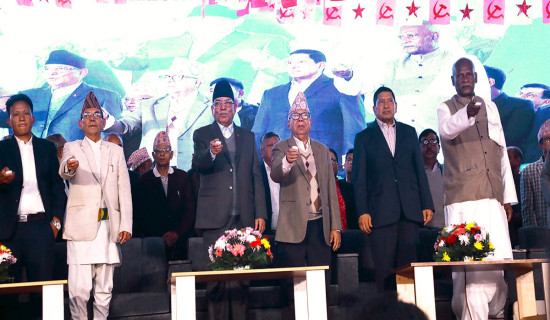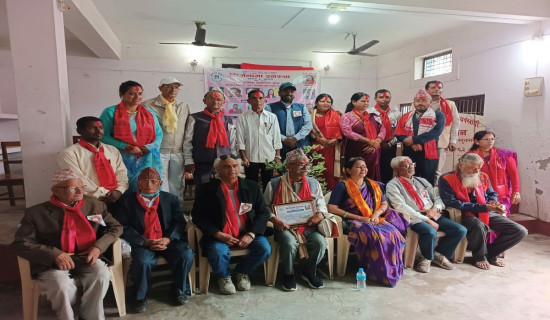- Wednesday, 5 November 2025
Party campaign offers hope, says Sapkota
With an aim to ensure that the accomplishments of the government led by the CPN (Maoist Centre) reach the public, the party has launched ‘Maoist with People: A Campaign for Special Transformation’ across the country since September 2. The party's three-month campaign is focused on establishing a well-structured party by convening a statute convention.
In this context, Gorkhapatra Corporation's Consultant Editor, Upesh Maharjan, and reporter Birendra Oli conducted an interview with Agni Prasad Sapkota, a former Speaker of the House of Representatives (HoR) and Vice Chairman, and Spokesperson for the CPN (MC).
The interview centered on topics such as the government's initiatives and activities, as well as the amendment bill related to the Truth and Reconciliation Commission, among others. Excerpts:
Could you please share your experience of assuming the roles of party Vice Chairman and Spokesperson after previously serving as Speaker?
As you mentioned, 11 years ago, I held the role of party spokesperson. After a significant transformation, I have now again assumed the position of the party Spokesperson. Amid the evolving landscape of information technology, a notable transformation has occurred. In this challenging yet promising context, I have willingly embraced the challenge and resumed my responsibilities.
How to you review the situations when Parliament was dissolved twice during your tenure as the Speaker?
The HoR was dissolved twice within a span of six months during the same term. It was a malicious attempt to subvert the constitution. Importantly, in both instances, we managed to successfully reinstate the parliament. This victory isn't just ours; it belongs to the people and the nation. For that, I personally appeared in the Supreme Court and filed a case against the incumbent President, Prime Minister, Chief Justice, Speaker of the National Assembly regarding appointments made against the Constitution.
There is no other example like this in world history. The parliamentary activities were generally successful under my leadership, although I faced limitations in utilising my capabilities. The 5th and 6th sessions were disrupted by COVID-19, the 7th and 8th by House dissolution, and the 9th and 10th encountered obstructions. However, the 11th budget session successfully passed 30 bills, which is a significant achievement.
How do you analyse the government's activities?
The government's objective is to achieve good governance and prosperity while ensuring social justice. The government has taken significant measures in this direction. The government has undertaken crucial legislative efforts to support victims of loan sharks. The government has proceeded with greater prudence, not only in the enactment of laws but also in their effective implementation, yielding positive outcomes. Additionally, significant achievements have been made by making hassle-free service delivery. The government has demonstrated a strong commitment to combating corruption by conducting thorough investigations into cases such as gold smuggling, taking action against those responsible in the Lalita Niwas case, and addressing various other instances of corruption. Records of irregularities and corruption will be progressively disclosed.
What is your response to the allegations that the government is showing favouritism to its acquaintances while singling out others?
This is merely external propaganda; internally, there is no such bias. The Prime Minister has already stated that even ministers won't be spared if found guilty of corruption. This statement demonstrates that the government is not showing favoritism but rather treating everyone equally.
Why were Maoist leaders exempted from even a general inquiry when their involvement in the gold smuggling case was revealed?
The Central Investigation Bureau (CIB) has conducted interrogations of the accused leader. The government does not arrest anyone or take action solely based on accusations made by someone or media reports without concrete facts and evidence. Actions are pursued only when supported by factual evidence and a proper legal process.
If Maoist leaders are found guilty, will they also face penalties?
The Prime Minister has publicly stated that he, too, should be subject to punishment if found guilty.
Is the bill related to Enforced Disappearances Enquiry, Truth and Reconciliation Commission Act amendment bill nearing finalisation?
The Prime Minister has made significant efforts to advance the amendment bill. Ongoing discussions among the top three leaders are in progress, and after rigorous deliberations within the parliamentary committee, it has now reached its final stages. In this context, to complete the remaining tasks of the peace process, discussions were being held with the late Chairman of the Constituent Assembly, Subash Chandra Nembang. Despite potential challenges that may arise due to his death, the Prime Minister is committed to pushing the bill forward. I am hopeful that the bill will be successfully passed during this session.
Is there a problem in establishing consensus among the top leaders to pass the bill?
Reaching a consensus among the top leadership is proving to be challenging. However, I believe through persistent discussions, debates, and dialogues, it is both achievable and imperative to reach a conclusive decision.
What level of success is anticipated from the Prime Minister's visits to the United States and China?
I believe the nation will be effectively represented when the Prime Minister addresses the United Nations General Assembly. Additionally, the sideline discussions are also regarded as highly significant.
Likewise, preparations are in progress for China visit. The Prime Minister has held extensive consultations with experts, including former Prime Ministers and top leaders. Similarly, the Foreign Minister has held continuous consultations with experts. There has been an extensive discussion in preparation for the China visit.
Having recently returned from China visit, which key issues do you believe should be at the forefront of the government's priorities?
Regarding the China visit, numerous topics are emerging. It's apparent that the past agreements and understandings, such as the opening of border crossings between China and Nepal, should be implemented. Apart from this, we think that significant agreements should be reached on various issues, encompassing development, construction, and hydropower.
In a different context, what has been the CPN (MC)'s experience with the campaign initiated from September 2 until now?
The party's three-month campaign has progressed smoothly. On Friday, I held discussions with the provincial in-charges from all ten provinces. We have successfully achieved 75 percent of the goals and objectives set by our party for this campaign.
What kinds of feedback, complaints, and recommendations has the party garnered throughout this campaign?
People have high expectations from us, and when these expectations cannot be met, they express their grievances. The interaction and relationship between the people and the party have somewhat weakened. As a result, there have been suggestions to increase the frequency of interactions with the people and to revitalize the relationship.
Additionally, we have started to become more entrenched in urban areas. In the past, we were there for the people during both their joys and sorrows. However, we have received criticism for distancing ourselves from the people.
We have genuinely made efforts to understand people's situation, listen it attentively, and understand their emotions. This campaign is different from the previous two-month campaign.
Does this campaign approach signal an increased confidence in forming a robust and organised party?
Glimmers of hope have emerged during the party's three-month campaign, spanning all ten provinces, including non-geographical provinces. While it's not claimed to be an outright success, the campaign has left an impression that it has the potential for success, akin to the saying, "Morning gives a glimpse of the day.”
Amid a trend of youth seeking opportunities abroad, what message would you like to convey to them?
The number of Nepalis seeking opportunities abroad has seen a significant rise. The youth are becoming less visible in rural areas. To stop them from going abroad, it's essential to rebuild the foundations of socialism, focusing on job creation, production growth, and economic self-sufficiency to improve living standards and combat poverty.
The pivotal step is to generate employment opportunities domestically; otherwise, there will be little to prevent them from seeking opportunities abroad.
(Translated by Arpana Adhikari)

